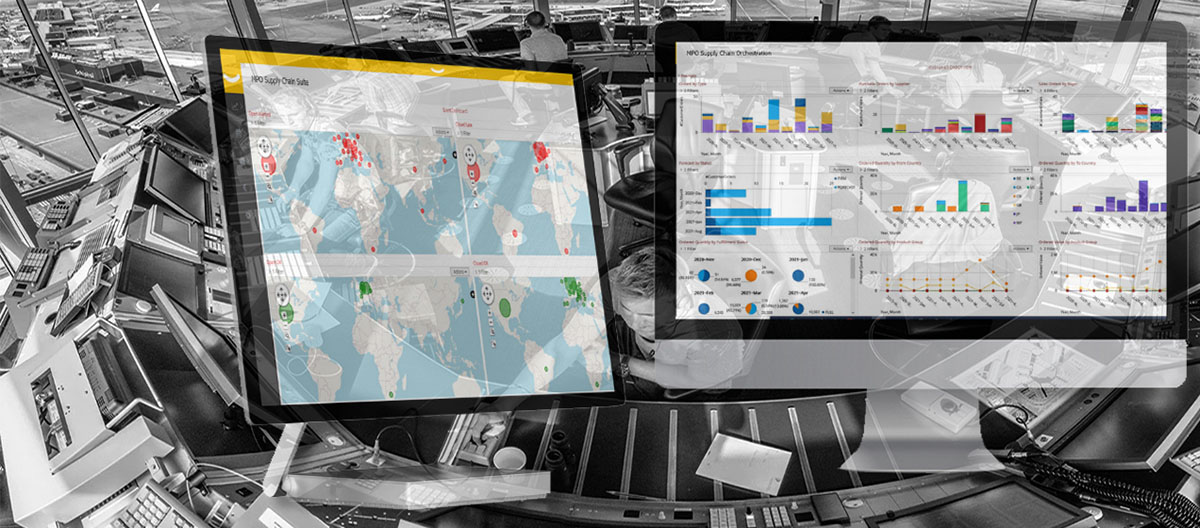

Finance
How Much Do Supply Chain Analysts Make?
Modified: December 29, 2023
Discover the average salary and earning potential of supply chain analysts in the finance industry. Find out how much do supply chain analysts make and plan your career accordingly.
(Many of the links in this article redirect to a specific reviewed product. Your purchase of these products through affiliate links helps to generate commission for LiveWell, at no extra cost. Learn more)
Table of Contents
Introduction
Supply chain management is a critical function that ensures the smooth flow of products and services from suppliers to customers. It involves the coordination and optimization of various activities, including sourcing, procurement, production, inventory management, transportation, and distribution. Among the key roles in this field is that of a supply chain analyst, whose primary responsibility is to analyze and improve the efficiency and effectiveness of the supply chain process.
Supply chain analysts play a crucial role in identifying and implementing strategies to streamline operations, reduce costs, and enhance overall performance. They use data analysis tools and techniques to evaluate the existing supply chain system, identify areas of improvement, and develop action plans to address issues and optimize the flow of goods and services.
To excel in this role, supply chain analysts need a combination of technical and analytical skills, as well as a strong understanding of the financial aspects of supply chain management. They work closely with cross-functional teams, including suppliers, manufacturers, distributors, and logistics providers, to align strategies, improve coordination, and minimize disruptions.
In addition to technical expertise, supply chain analysts must possess excellent communication and problem-solving skills. They need to effectively communicate their findings and recommendations to stakeholders at all levels of the organization, from managers to executives. They are also responsible for monitoring key performance indicators (KPIs) and providing regular reports on supply chain performance.
Let’s explore the education and experience requirements, responsibilities, and skills required to be a successful supply chain analyst in more detail.
Education and Experience Requirements
To become a supply chain analyst, a minimum of a bachelor’s degree is typically required. While there is no specific degree that is mandatory, many employers prefer candidates with a degree in supply chain management, logistics, operations management, business administration, or a related field.
In addition to formal education, relevant work experience is highly valued in this field. Many companies seek candidates with previous experience in supply chain management, logistics, data analysis, or a similar role. This experience allows individuals to develop a deep understanding of the complexities and challenges of managing supply chains.
Proficiency in data analysis and knowledge of supply chain management software is also important for supply chain analysts. Strong analytical and technical skills, including proficiency in data visualization tools like Tableau or Power BI, as well as proficiency in Microsoft Excel, are highly beneficial for analyzing large sets of data and deriving insights.
Supply chain analysts may also benefit from pursuing certifications in supply chain management, such as the Certified Supply Chain Professional (CSCP) certification offered by APICS, or the Certified Professional in Supply Management (CPSM) certification offered by the Institute for Supply Management (ISM). These certifications demonstrate a commitment to professional development and can enhance job prospects and earning potential.
While a bachelor’s degree and relevant experience are typically the minimum requirements, some employers may prefer candidates with postgraduate degrees, such as a Master of Business Administration (MBA) with a focus on supply chain management. These advanced degrees provide a comprehensive understanding of business concepts and strategic supply chain management principles.
Overall, a combination of formal education, relevant work experience, and a strong skill set in data analysis and supply chain management software is essential to succeed as a supply chain analyst.
Responsibilities of a Supply Chain Analyst
As a supply chain analyst, you will have a diverse range of responsibilities that revolve around analyzing and optimizing the supply chain process. Some of the key responsibilities include:
- Data Analysis: Conducting in-depth data analysis to assess the performance of the supply chain, identify trends, and uncover areas for improvement. This includes analyzing inventory levels, transportation costs, production cycles, and customer demand patterns.
- Forecasting and Demand Planning: Collaborating with demand planning teams to develop accurate forecasts and ensure optimal inventory levels. This involves analyzing historical sales data, market trends, and other relevant factors to predict future demand.
- Inventory Management: Optimizing inventory levels to meet customer demand while minimizing holding costs. This includes implementing inventory control techniques, setting reorder points, and analyzing lead times to ensure efficient supply chain operations.
- Supplier Relationship Management: Establishing and maintaining strong relationships with suppliers to ensure a reliable supply of raw materials or finished goods. This involves evaluating supplier performance, negotiating contracts, and identifying potential alternative suppliers.
- Process Improvement: Identifying bottlenecks and inefficiencies within the supply chain and implementing process improvements. This can include streamlining order fulfillment, improving transportation routes, or implementing new technologies to enhance efficiency.
- Cost Analysis: Analyzing costs associated with the supply chain, such as transportation, warehousing, and procurement costs. This includes identifying cost-saving opportunities, conducting cost-benefit analyses, and implementing cost reduction strategies.
- Performance Monitoring and Reporting: Monitoring key performance indicators (KPIs) to track the performance of the supply chain. This involves generating regular reports and presenting findings to management, highlighting areas of success and areas for improvement.
These responsibilities may vary depending on the organization and industry. However, the underlying focus of a supply chain analyst is always on optimizing processes, reducing costs, and improving overall supply chain efficiency.
Skills Required for Supply Chain Analysts
Supply chain analysts require a unique set of skills to effectively analyze and optimize the supply chain process. Some of the key skills required for this role include:
- Data Analysis: Proficiency in data analysis and the ability to work with large sets of data is essential. Supply chain analysts should be able to extract meaningful insights from data, perform statistical analyses, and use data visualization tools to present findings.
- Technical Skills: Strong technical skills are crucial for supply chain analysts. Proficiency in supply chain management software, such as enterprise resource planning (ERP) systems and inventory management tools, is highly valued. Additionally, proficiency in data analysis tools, such as Microsoft Excel and data visualization software, is important for effectively analyzing and presenting data.
- Supply Chain Knowledge: A solid understanding of supply chain processes, logistics, and inventory management is necessary. Supply chain analysts need to be familiar with concepts such as demand forecasting, sourcing strategies, transportation management, and supplier relationship management.
- Analytical Thinking: Critical thinking and problem-solving skills are key attributes for supply chain analysts. They need to be able to identify and analyze complex problems, generate innovative solutions, and make data-driven decisions to optimize supply chain operations.
- Communication and Collaboration: Effective communication and collaboration skills are crucial as supply chain analysts work with cross-functional teams and stakeholders at various levels of the organization. They need to be able to clearly communicate their findings, recommendations, and insights to non-technical audiences.
- Project Management: Supply chain analysts often work on projects aimed at improving supply chain efficiency. Therefore, strong project management skills, including the ability to manage timelines, resources, and stakeholders, are essential to successfully implement process improvements.
- Adaptability: The supply chain landscape is constantly evolving, and supply chain analysts need to be adaptable and open to change. They should be able to quickly adapt to new technologies, industry trends, and market demands to ensure the ongoing optimization of the supply chain.
Continued learning and staying up-to-date with the latest advancements in supply chain management and technology is also crucial for supply chain analysts to stay ahead in their field.
Average Salary of Supply Chain Analysts
The salary of a supply chain analyst can vary based on factors such as industry, location, experience, and education. However, on average, supply chain analysts can expect a competitive salary that reflects the importance of their role in optimizing supply chain processes.
According to the Bureau of Labor Statistics (BLS), as of May 2020, the median annual wage for logisticians, which includes supply chain analysts, was $76,270. The lowest 10% earned less than $46,300, while the highest 10% earned more than $118,310.
It’s important to note that these figures are indicative of the overall logistics and supply chain management field, which includes various roles beyond supply chain analysts. Supply chain analysts may earn slightly higher salaries due to their specialized skill set and expertise.
The salary range for supply chain analysts typically starts around $50,000 and can go up to $100,000 or more with several years of experience and advanced qualifications. Bonuses and benefits, such as healthcare and retirement plans, may also be included in the compensation package.
While experience plays a significant role in determining salary, other factors such as education and industry can also influence earnings. Those with advanced degrees, such as an MBA or a master’s in supply chain management, may command higher salaries. Additionally, working in industries such as manufacturing, aerospace, or technology may offer higher compensation compared to other sectors.
Keep in mind that salary ranges can vary based on the cost of living in different locations. Supply chain analysts in metropolitan areas or regions with a higher cost of living may receive higher salaries to offset the increased expenses.
Overall, supply chain analysts can expect a competitive salary with opportunities for growth and advancement within the field.
Factors That Influence Salary
Several factors influence the salary of a supply chain analyst, including:
- Experience: One of the most significant factors that determine salary is the level of experience. As supply chain analysts gain more experience and expertise in their field, they become more valuable to employers, which may lead to higher salary offers.
- Education and Qualifications: Higher levels of education, such as a master’s degree or certifications in supply chain management, can positively impact salary. Advanced qualifications demonstrate a commitment to professional development and can enhance job prospects and earning potential.
- Industry: The industry in which a supply chain analyst works can have a significant influence on salary. Certain industries, such as technology, manufacturing, or aerospace, may offer higher compensation due to the complexity and scale of their supply chain operations.
- Company Size and Scope: Larger companies with extensive supply chain networks and complex operations may offer higher salaries compared to smaller organizations. The scope and scale of the supply chain processes managed by the company can impact the level of responsibility and therefore the salary offered.
- Location: The geographic location can significantly affect salary ranges due to differences in the cost of living and demand for supply chain analysts in specific areas. Major metropolitan areas and regions with a high cost of living generally offer higher salaries.
- Skills and Expertise: Specific skills and expertise in areas such as data analysis, supply chain optimization, and technology can make a supply chain analyst more valuable and marketable, potentially leading to higher salary offers.
- Performance and Achievements: Exceptional performance, achievements, and tangible results achieved by a supply chain analyst can have a positive impact on salary. Those who consistently exceed expectations and contribute significant improvements to the supply chain may receive higher compensation.
It’s important to note that these factors are not mutually exclusive, and they can interact with each other to determine the ultimate salary offered to a supply chain analyst. Understanding these influencing factors can help professionals in the field make informed decisions about their career path and negotiate appropriate compensation packages.
Industries and Locations with Highest Paying Jobs for Supply Chain Analysts
The salary of a supply chain analyst can vary greatly based on the industry and location in which they work. Here are some industries and locations known to offer some of the highest paying jobs for supply chain analysts:
- Technology: The technology industry is known for offering competitive salaries for supply chain analysts. Technology companies often have complex and rapidly evolving supply chain networks, which require skilled professionals to optimize and manage. Examples include major tech companies involved in manufacturing electronics, software, and hardware.
- Aerospace and Defense: The aerospace and defense sector also offers attractive salaries for supply chain analysts. The industry’s strict regulations, global supply chains, and high-value products make supply chain expertise vital. Roles in this industry can involve managing the procurement and delivery of various components used in aerospace and defense systems.
- Manufacturing: Manufacturing companies, especially those involved in industries such as automotive, pharmaceuticals, and consumer goods, require skilled supply chain analysts to drive operational efficiency. These companies often deal with complex supply networks and have a high demand for professionals who can optimize processes and reduce costs.
- Consulting: Supply chain consulting firms that work with clients across various industries often offer competitive salaries. These firms provide specialized expertise and solutions to optimize supply chain operations for their clients. Supply chain analysts in consulting roles may work on diverse projects across different industries.
- Finance: The finance industry, encompassing banking, investment firms, and insurance companies, places a high value on efficient supply chain management. Supply chain analysts in this sector focus on managing the flow of financial products and services. These roles often involve working on complex procurement strategies and optimizing processes across the financial supply chain.
In terms of locations, supply chain analysts working in major metropolitan areas and regions with high living costs tend to command higher salaries. Some of the locations known for offering higher salaries for supply chain analysts include cities like San Francisco, New York, Seattle, Los Angeles, and Boston in the United States. Additionally, countries with strong economies and well-developed supply chain networks, such as Germany, Switzerland, and Singapore, often offer competitive salaries for professionals in this field.
It’s important to note that salary ranges can vary based on individual factors such as experience, education, and specific job responsibilities. Professionals in the field should carefully consider their desired industry and location when seeking higher-paying opportunities as a supply chain analyst.
Conclusion
Supply chain analysts play a vital role in optimizing the efficiency and effectiveness of the supply chain process. Their responsibilities include analyzing data, identifying areas for improvement, and implementing strategies to enhance supply chain performance. As businesses increasingly prioritize supply chain management, the demand for skilled supply chain analysts continues to grow.
Education and experience requirements for supply chain analysts typically include a bachelor’s degree, preferably in supply chain management or a related field. However, a master’s degree or relevant certifications can enhance job prospects and earning potential. Strong analytical skills, supply chain knowledge, and proficiency in data analysis software are essential for success in this role.
The average salary for supply chain analysts can vary based on factors such as industry, location, experience, and education. While the median annual wage for logisticians, which includes supply chain analysts, was $76,270, it can range from $50,000 to $100,000 or more. Factors that influence salary include experience, education, industry, company size, location, skills, and performance.
Industries such as technology, aerospace and defense, manufacturing, consulting, and finance are known to offer higher salaries for supply chain analysts. Major metropolitan areas and regions with high living costs also tend to provide more lucrative opportunities.
In conclusion, a career as a supply chain analyst offers great potential for growth, competitive salaries, and the opportunity to make a significant impact on the efficiency and success of supply chain operations. With the increasing emphasis on supply chain optimization across industries, supply chain analysts are playing a critical role in driving business success and ensuring customer satisfaction.














